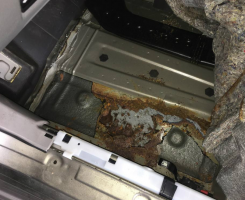
— A Nissan Altima and Maxima floorboard rust lawsuit has been partly dismissed after the automaker filed a motion to dismiss the complaint.
Plaintiff Laura Frances Hays alleges 2002-2006 Nissan Altima and 2004-2008 Nissan Maxima vehicles suffer from rusted floorboards that leave drivers afraid of using the vehicles.
Hays purchased her Nissan Altima in April 2003 which was covered by a new vehicle limited warranty that offered basic coverage for 36 months or 36,000 miles, whichever came first.
The Altima also came with a separate warranty that covered rust and corrosion for 60 months, regardless of mileage. However, the plaintiff did not review the warranty prior to buying the car.
In February 2015 and after watching a local news report about rusty floorboards in Altimas, Hays says she had the car inspected for rust the next time she had it serviced. The inspection showed the passenger floor pan had corroded, so she contacted Nissan about the rust.
The plaintiff says she had the floorboards repaired in December 2015 then traded the Altima in March 2016 when the car had 104,000 miles on it.
According to the rusted floorboard lawsuit, the front floor pans in Altimas and Maximas have two layers and each layer has a "tooling hose" used only for “location and movement of the floor pan during assembly at the manufacturing facility.”
Allegedly defective butyl patches cover the tooling holes in the floor layers and the corrosion allegedly starts in the areas of the holes.
Nissan received the first two reports of rusted floorboards from Canada in 2006 and more complaints followed over the years, especially in areas where road salt was used in the winter. In addition, customers typically claim they pay between $3,000 and $4,600 for repairs to the floorboards.
In 2011-2012, Nissan conducted an investigation into the corrosion problems and concluded the rusted floorboards resulted in a “[h]igh customer dissatisfaction issue in Canada and US salt area.” The lawsuit alleges Nissan developed a process to repair the corrosion which required cutting out the corroded floor pan and replacing it.
The lawsuit also alleges Nissan considered repairing all the affected vehicles but didn't because the estimated cost was $749 million. Instead of replacing the corroded floor pans, Nissan proposed covering them with patches.
Nissan filed a motion to dismiss the Altima and Maxima floorboard rust class action lawsuit and succeeded in getting most of the claims dismissed.
The judge tossed a breach of express warranty claim but denied Nissan's motion to dismiss a claim for violating the Missouri Merchandising Practices Act.
However, the judge did dismiss a claim of fraudulent concealment, which under Missouri law is “fraud by silence.”
Nissan argued Hays’ claim of fraudulent concealment of the alleged defect failed because Nissan "had no superior knowledge of the Defect at the time Hays bought the Vehicle, and (ii) had no duty to disclose the possibility that a Defect may manifest itself after the express warranty has expired."
According to the judge, the plaintiff admits the earliest Nissan was put on notice of a rusted floorboard problem was in 2006. This means the plaintiff cannot "establish that at the time of her purchase of the Vehicle in 2003, Nissan had 'superior knowledge' of the Defect to prevail on her claim of fraudulent concealment."
The judge said Hays drove her Altima from 2003 until 2015, almost seven years after the corrosion warranty expired and she never complained about corrosion problems during that time.
The Court also agreed with Nissan that it was under no duty to disclose the defect may manifest after expiration of the express warranty. The judge referenced a similar argument in a case titled, Owen v. Gen. Motors Corp.
In that case, the Eighth Circuit held “that the unremarkable knowledge that a windshield wiper motor guaranteed for three years might be prone to failure due to fatigue sometime after the warranty expires is too broad an assertion to establish the type of superior knowledge that can substitute for the false representation element of fraudulent concealment.”
“Indeed, every consumer must be charged with the knowledge that a product she purchases may and probably will break at some point in the future, most likely after the warranty has expired.”
Nissan also won its argument concerning Hays’ claim of breach of implied warranty of merchantability under the Magnuson-Moss Warranty Act.
Nissan said the claim was time-barred and the Altima was "not unmerchantable at the time of its sale." The judge agreed and found that Hays drove her Altima for more than a decade from 2003 and the floorboard rust did not manifest itself until 2015.
“This extensive performance satisfies a minimum level of quality such that Defendants did not breach the implied warranty of merchantability based on [Hays’] allegations.”
The judge also dismissed a claim against Nissan of unjust enrichment, but allowed a claim of emotional distress damages to continue.
The Nissan Altima and Maxima floorboard rust lawsuit was filed in the U.S. District Court for the Western District of Missouri - Laura Frances Hays, et. al., v. Nissan North America, Inc, et. al.
The plaintiff is represented by Williams Dirks Dameron LLC, Stueve Siegel Hanson LLP, and Dollar, Burns & Becker.
Read complaints about floorboard rust in Nissan Altima and Maxima cars.




